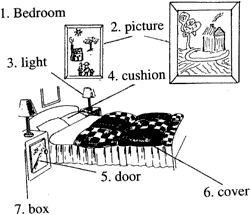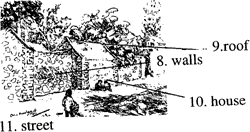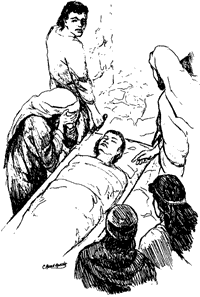Unit 13: Negatives
陰性
Pictured Words
描かれた単語
New Words
新しい単語

| 1. bedroom
1. 寝室 |
| 2. picture
2. 映像 |
| 3. light
3. ライト |
| 4. cushion
4. クッション |
| 5. door
5. ドア |
| 6. cover
6. カバー |
| 7. box
7. 箱 |

| 8. walls
8. 壁 |
| 9. roof
9. 屋根 |
| 10. house
10. 家 |
Nouns
名詞
確信
前部
意見
だれか
キャリッジ
フルーツ
停止
議論
助け
伸張
恐れ
知識
思考
感じ
唇
使用
Adjectives
形容詞
曲がった- まっすぐに
- 汚れたきれいにしなさい
概要
明るい- 暗闇
平ら
新しい
貧しい
Structure Words
構造の単語
早く
いかに
なぜ
Sayings
格言
Is not this a poor house?
これは悪い家ないか。
Let me see a new house, please.
私を新居を見ることを許可しなさい。
There is one over there.
1 つが向こうにある。
That one.
その。
This is not a new house.
これは新居でない。
How much is it?
それはどの位であるか。
May I not put the light on?
私はライトを置いてもよいか。
The light is over there.
ライトは向こうにある。
Has not the bed a nice cover?
ベッドを素晴らしいカバー持っていないか。
Other forms of the negative
陰性の他の形態
There are other ways of saying the negative.
陰性を言う他の方法がある。
In statements with the verb "to be" the word "not" may be put with it:
動詞の声明に"" 単語"であることはそれとない" 置かれるかもしれない:
Am I not to get you a place?
場所を見つけてあげる私はないか。
Is there not Boaz?
Boaz がないか。
These are negative questions.
これらは否定的な質問である。
If we make them into negative statements they would be:
私達が否定的な声明にそれらを作ればそれらは次のとおりである:
I am not to get you a place
私は場所を見つけてあげるべきでない
There is not Boaz
Boaz がない
In each statement, "not" makes it negative.
各声明では、"ない" それを否定的にさせる。
Negatives with the verb "to have" also do the same thing as those with the verb "to be":
"あるために" また動詞とのそれらと持つべき動詞"の陰性は同じ事を" する:
Naomi had a relation
Naomi に関係があった
Naomi had not a relation
Naomi に関係がなかった
These statements are opposites.
これらの声明は反対である。
The first is positive and the second is negative.
第1 肯定的であり、第2 は否定的である。
Negative statements in the Present time (Tense) are made by using "do":
現在(時制) の否定的な声明は"使用によって" なされる:
but do not let him see you
しかし彼を会うことを許可してはいけない
do not go back to your mother-in-law with nothing in your hands.
あなたの手の何ものあなたの義母に行ってはいけない。

The Widow's Son
寡婦の息子
And it came about, after a little time, that he went to a town named Nain;
そしてそれは、少し時間後に、について彼によってがNain と示された町に行ったそれ来た;
and his disciples went with him, and a great number of people.
そして彼の弟子は彼および多数の人々と行った。
Now when he came near the door of the town, a dead man was being taken out, the only son of his mother, who was a widow;
今彼が町のドアの近くに来た、死んだ人は、寡婦だった彼の母の唯一の息子取られていた;
When the Lord saw her, he had pity on her and said to her, Be not sad.
主が彼女に会ったときに、彼は彼女の同情を有し、彼女に言われて、悲しくないがあってはいけない。
And he came near, and put his hand on the stretcher where the dead man was: and those who were moving it came to a stop.
そして彼は近く来、死んだ人がいた伸張器に彼の手を置いた: そしてそれを動かしていた人々は停止に来た。
And he said, young man, I say to you, Get up.
そして彼は言った、若者は、私はあなたに言う、起きる。
And the dead man got up, and words came from his lips, And he gave him to his mother.
そして起きた死んだ人単語は彼の唇から来、および彼は彼の母に彼を与えた。
Fear came on all, and they gave praise to God, saying, A great prophet is among us: and, God has given thought to his people.
恐れはすべてに来、それらは私達の中に神に賞賛、格言、A のすばらしい予言者をある与えた: そして、神は彼の人々に思考を与えた。
Additional Reading
付加的な読書
The story of the Widow's Son comes to us from Luke who was a medical man and so we can think of his discussion as a responsible account of what took place there on that day.
寡婦の息子の物語は医学人だった従って私達は責任がある記述として彼の議論についてことができるルークから私達に考えるそこに起こったものがのその日に来。
In fact he makes use of some words which only a medical man could have knowledge of.
実際は彼は医学人しか知識があることができないある単語を利用する。
Even today, there is a place there for putting dead persons into holes among the rough stones and that is where the great number of people were going with the body of the dead boy.
均一な今日、荒い石間の穴に死んだ人を入れるのため場所そこにであり、それは多数の人々が死んだ男の子のボディと行っていたところである。
The group would be loud in their cries and very sad, for that was usual with death.
グループは叫びで騒々しく、非常に悲しい、なぜならそれは死と通常だった。
It was the opinion of every one then that to put your touch on a dead man's carriage made you unclean, but Jesus did just that.
死んだ人のキャリッジにあなたの接触を置くことはunclean 作ったが、イエス・キリストがちょうどそれをした各自ののは意見そしてだった。
So everyone stopped, of course.
そう皆は、当然停止した。
The place was near where the prophet Elisha gave new life to the boy that we had a story about in Unit 6: "On a Very Hot Day".
場所は私達は単位6 で物語を約有したこと予言者Elisha が男の子に新しい生命を与えたところ近くだった: "非常に熱い日で" 。
This miracle therefore had special value to persons there.
従ってこの奇跡に人に特別な価値がそこにあった。
They would hold the story of Elisha very dear to them, and that would have been another reason why they were saying, "A great prophet is among us: and, God has given thought to his people".
彼らはElisha の物語をそれらに非常に貴重保持し、なぜ言っていたかそれは私達の中にもう一つの理由、"すばらしい予言者あるであろう: そして、神は彼の人々に思考を"与えた。
The important point, however, is that the prophet Elisha stretched himself seven times on the body of the boy, but Jesus only said "Get up" and the boy sat up.
しかし重要なポイントは予言者Elisha が7 回彼自身を男の子のボディの伸ばしたが、坐る男の子"言われるただイエス・キリストは起き、" ことである。
So, in the eyes of the people it was a much greater miracle.
そう、人々の目にそれは大いにより大きい奇跡だった。
Jesus was very kind.
イエス・キリストは非常に親切だった。
The word that was made use of with respect to his feelings has the idea of "being deeply moved in his heart".
彼の感じに関して利用された単語に"彼の中心の深く移動" の考えがある。
So this story gives us some idea of how truly kind he was.
そうこの物語は偽りなく親切彼がいかにのあったか私達に考えを与える。
He did this to give help to the widow who would be completely dependent upon her son for her needs.
必要性彼女のための彼女の息子に完全に依存している寡婦に助けを与えるために彼はこれをした。
He was not making himself seem important.
彼は彼自身をようである重要な作っていなかった。
This story also has relation to a belief held by many people in those times.
この物語にまたそれらの時で多くの人々が保持する確信に関係がある。
They thought that God had no sense of feeling.
彼らは神に感じの感覚がなかったと考えた。
But, Jesus let it be known by his act that God was very conscious of the needs of men.
しかし、イエス・キリストは神が人の必要性を非常に意識していたことそれに彼の行為によって知らせた。
Helpful Notes
有用なノート
| pity
同情 | having sadness of heart.
中心の悲しさを持っていること。 |
| miracle
奇跡 | something not often seen.
頻繁に見られない何か。 |
| stretcher
伸張器 | a thing to take rest on.
残りを取る事。 |
| responsible
責任がある | having a good relation with others.
他のよい関係を持っていること。 |
| account
記述 | saying a story.
物語の発言。 |
| conscious
意識した | having knowledge of the things around one.
1 つのまわりの事の知識を持っていること。 |